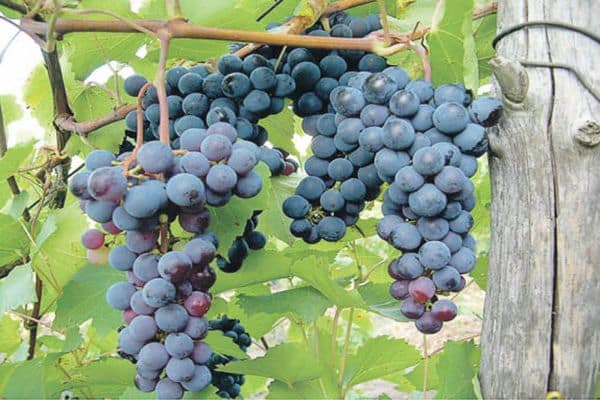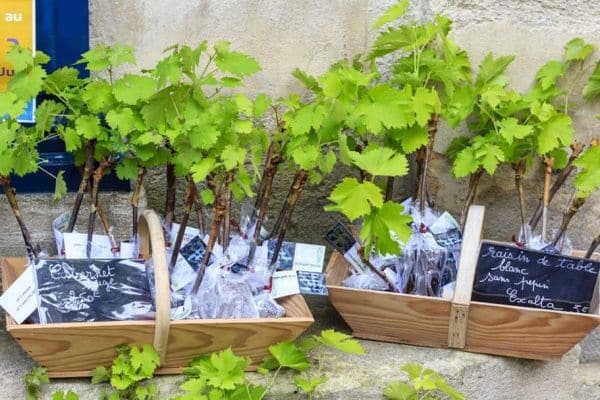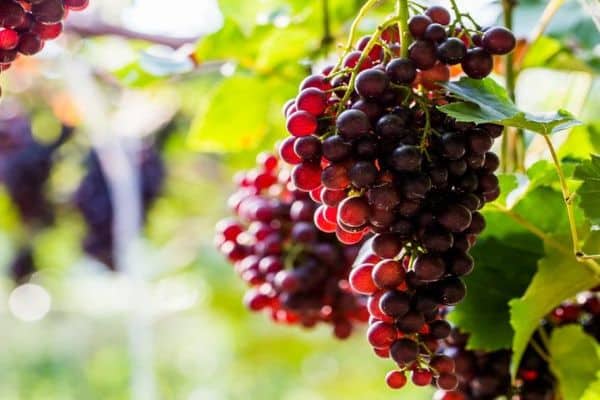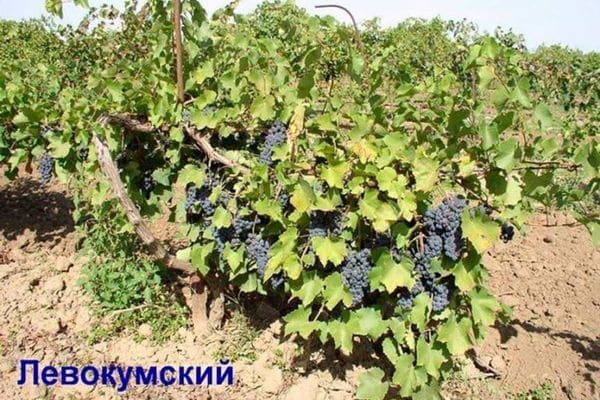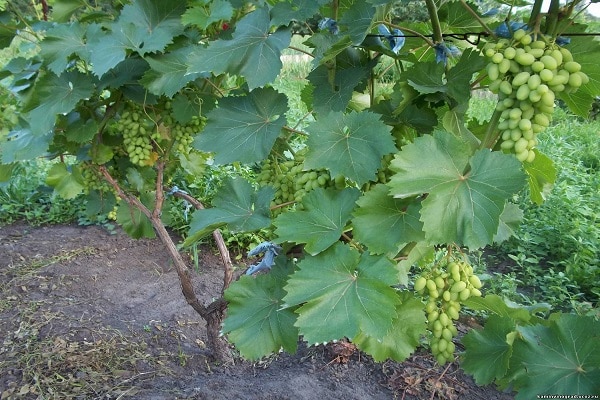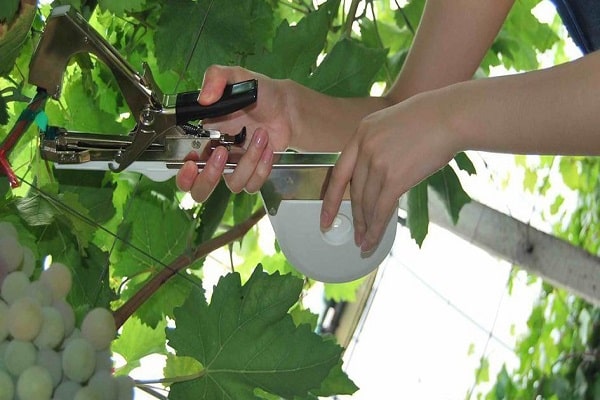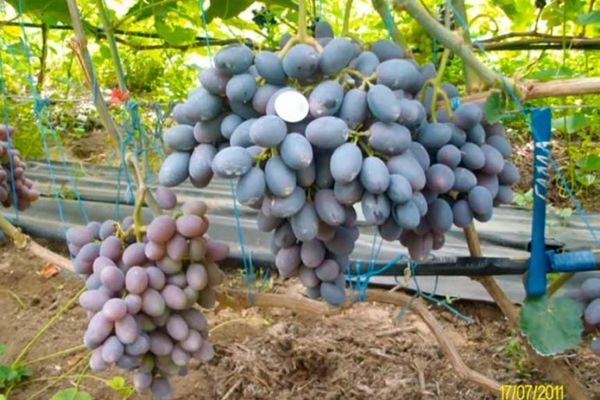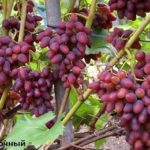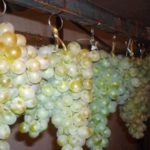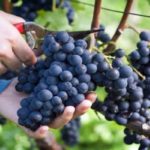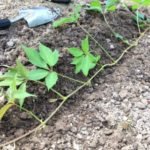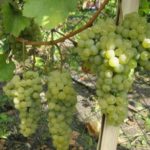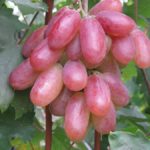Despite the popularity of dessert grape varieties, owners of summer cottages also try to grow technical varieties used for making preserves, wine, and juice. Usually there are no problems with growing crops; even beginners with a minimum of knowledge can cope with the simple process. Preference is often given to Levokumsky grapes, which have remarkable qualities - juicy fruits, persistent aroma, rich taste. Before you start growing a variety, it is better to familiarize yourself with the rules of planting and care - this will help you avoid annoying mistakes and get a good harvest.
- Origin of the hybrid Levokumsky
- Advantages of technical grape varieties
- External description
- Kusta
- Yagod
- Characteristics of grapes
- Resistance to diseases and low temperatures
- Pollination and yield
- Reproduction
- Planting and care
- Soil and hole preparation
- Technology of planting seedlings
- Irrigation
- How and with what to fertilize
- Formation of a fruitful vine
- Mulching for the winter
- Seasonal processing
- From fungal and infectious diseases
- Bird control
- How to deal with wasps
- Harvesting and storage
Origin of the hybrid Levokumsky
The technical variety has no breeding roots; the crop was bred in one of the villages of the Stavropol region by ordinary peasants. The village of Levokumskoye has been famous for its winemaking since ancient times; its products were distributed throughout Russia and even gained popularity in neighboring countries.
The age of the variety is up to two hundred years. This time was enough for Levokumsky to spread throughout the country and gain popularity among lovers of these wonderful fruits.
Advantages of technical grape varieties
One of the undeniable advantages of the culture is its high frost resistance. Levokumsky will easily tolerate severe frosts (about 30 degrees) without covering. The benefits also include:
- light shelter allows the grapes to withstand up to 40 degrees below zero;
- fruit juiciness;
- disease resistance;
- endurance (unstable climatic conditions do not affect productivity).
Another advantage of Levokumsky is its ease of care; with a minimum of attention, the plant will delight you with high yields.
External description
Externally, Levokum grapes differ little from other industrial crops grown for the purpose of processing into wine or juice.
Kusta
The plant grows quickly, so it will require regular pruning.The branches of Levokumsky are light brown, old shoots are covered with lignified bark.
The grape leaves are medium-sized, smooth, light in color, and divided into 5 lobes.
Yagod
The fruits of Levokum grapes are small, up to one and a half grams. The skin is thin, covered with a bluish coating. The taste is quite pleasant - the berries accumulate sugar well.
The clusters of Levokum grapes also do not differ in size - with proper care, the weight does not exceed 120 g. The shape is an elongated cylinder. Density is average.
Characteristics of grapes
Levokum grapes are classified as varieties of medium ripening period. It takes up to 4 months from flowering to harvesting the first wave of harvest. The yield is high - it’s quite easy to get more than a hundred centners of fruit per hectare.
Recommended for growing in regions with harsh climatic conditions. Feels great in the Moscow region, in the North Caucasus.
Resistance to diseases and low temperatures
Levokum grapes are resistant to low temperatures and, when covered, easily tolerate Siberian frosts. Diseases rarely affect the crop, but chemical treatment will have to be carried out against anthracnose and black spot.
A special feature of the Levokumsky variety is its immunity against common crop diseases. Gray rot and mildew do not affect bushes even in rainy seasons.
Pollination and yield
To pollinate Levokumsky, you do not need to plant pollinating plants; the grapes form bisexual inflorescences. Productivity is high - the small size of the bunch is compensated by its large number.
Reproduction
The technical variety Levokumsky is propagated by cuttings or layering. The survival rate is excellent. In harsh conditions, it is recommended to cover the cuttings - there is a risk of freezing.Reproduction by layering allows you to obtain high-quality young plants during the season, but it is better not to rush into transplanting from the mother bush until next year.
Planting and care
It is easy to achieve good yields of Levokumsky grapes by fulfilling the main conditions. Fulfilling planting requirements, proper care, and regular watering are the basic rules that allow you to achieve active fruiting just 2-4 years after planting.
Soil and hole preparation
It is recommended to prepare the hole for planting Levokum grape seedlings in advance. You should enter:
- humus;
- sand;
- peat;
- garden soil.
Be sure to lay a layer of drainage - with excess moisture, the roots of Levokumsky bushes rot.
Technology of planting seedlings
When planting in a row, it is recommended to leave up to 2 m between the holes of Levokum grapes. When planting several rows, it is better to use a checkerboard pattern with a row spacing of up to 1.5 m.
Irrigation
Water as needed, especially in extreme heat. It is better to irrigate the soil in the evening, using water infused under the sun. Before moistening the soil, loosen it.
How and with what to fertilize
Do not use fresh organic matter to fertilize bushes. Dilute compost or humus into a bucket of water 1-2 kg.
Of the purchased drugs, Plantafol has proven itself to be excellent. Dilute the fertilizer in accordance with the instructions; exceeding the nutritional components will cause burns to the roots.
Formation of a fruitful vine
Start forming the bush in the second year. Experienced gardeners recommend using a fan shape or a “two-arm cordon”.
The recommended height of the stem is no more than a meter. Remove excess shoots; overloading the vine will lead to creases.
Mulching for the winter
Using mulch is a great way to give the plant the nutrients it needs and protect it from temperature changes. Use humus, compost, spruce branches as a mulch layer. There is no need to use hay or dry leaves; there is a risk of rotting, which will affect the condition of the bush.
Seasonal processing
Regular chemical treatments will help protect Levokumsky grapes from diseases and pest invasion. It’s better not to expect damage from insects or diseases; preventive irrigation of the bush will save you from a long struggle with the gardener’s eternal enemies.
From fungal and infectious diseases
In the fight against anthracnose (indicated by ulcers on the bark of bushes, which lead to drying out of the vine), it is recommended to use “Anthracol”, a Bordeaux mixture. Against black spotting, irrigate with preparations containing a high percentage of copper.
For preventive purposes, apply treatment with “Kuproksat”, “Ridomil”. It is better not to use folk remedies; they are ineffective against infection.
Bird control
It is recommended to use humane methods of control against feathered guests of the vineyard - shooting or trapping is strictly prohibited. An excellent way to protect fruit-bearing plantings is to use a special mesh that does not block access to sunlight and fresh air.
You can resort to proven means - hang strips of polyethylene or cassette tapes near the vineyard.
How to deal with wasps
Using a net against wasps is not an effective protection; you will have to resort to more aggressive methods of controlling insects. Start exterminating wasps only after the ovary appears; during flowering, insects destroy the caterpillars.
The simplest and most accessible methods of fighting wasps are to prepare a sticky trap (pour a little honey into small bowls and place it in the vineyards) or use a smoke bomb. If you manage to find a nest, it is recommended to shake it into a plastic bag at night, tie it tightly, take it far into the forest or destroy it.
Harvesting and storage
It is recommended to collect the bunches during the period of full ripening, which occurs at the beginning of autumn. In warm regions, fruiting occurs earlier - at the end of summer. Carefully remove the bunches and place them on wooden racks or directly in a bucket (if the fruits will be processed immediately).
The shelf life of technical grade is up to a month, but subject to certain conditions. When collecting, try not to erase the bluish coating that protects against spoilage. Be sure to immediately send the fruits to a cool place with moderate humidity (cellar, refrigerator). The duration of storage will not affect the taste, but it is better to try to process it soon after harvesting.
Levokumsky grapes are an excellent variety for growing for winemaking purposes. The intoxicating drink made from the fruit is dark, with a rich berry flavor. The absence of difficulties in care, the undemanding nature of the crop allows you to get a harvest in a short time, which is enough to make aromatic wine, juices, and preserves.

